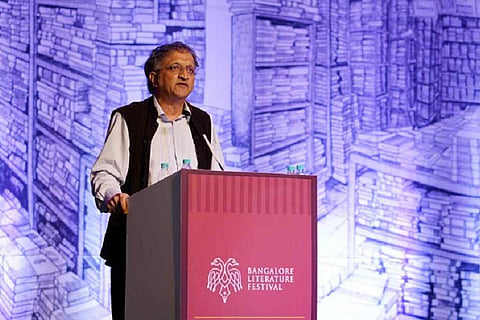

It’s time that women were granted equality before the eyes of god, said historian Ramachandra Guha, voicing his opinion about the raging controversy surrounding the entry of women in Sabarimala.
Speaking at the Bangalore Literature Festival on Saturday during his session ‘Is There an Indian Road to Equality?, he discussed the controversy surrounding the entry of women in Sabarimala and likened the struggle to Dalit movements of the 1920s, who sought entry into temples in Kerala.
"90 years ago, Dalits could not enter temples in Kerala, but this was challenged by social reformers like Narayana Guru and in the mid-1920s, there was a temple entry satyagraha in a temple in Vaikom. A member of the priestly caste, an OBC and a Dalit walked hand in hand into the temple. When they were beaten up, three others took their place. This started the temple entry movement across India,” he said.
He explained that there are three kinds of equalities Indian society should strive for -- equality in the eyes of the law, equality in everyday life and equality in the eyes of god. He added that it was time that women were given equality in the eyes of god.
"Equality in the eyes of god is much more important in India than it is in western democracies, which are largely secular. India is a land suffused with religiosity, ritual worship and the desire to visit sacred places. In this particular sphere, Dalits have made more progress than women," he said in his address.
He further added, “It took sacrifice, doggedness, courage and adherence to principle but eventually there came a time you could not deny Dalits entry into temples”. He indicated that it will take a similar kind of doggedness for women to enter the Sabarimala temple and take up positions like a temple priest.
Guha also threw his weight behind the Me Too movement that has seen scores of women speak up against sexual harassment and abuse in their workplace. “The revelations of the Me Too campaign reveals that the harassment and discrimination of women, sexual or otherwise, is an everyday reality in India. I applaud the courage of the women speaking up. The data on women withdrawing from workforce also paints a scary picture,” he said.
He drew similarities between the gender and caste equality movement in the country. “I had thought that discrimination on the lines of caste had reduced in urban areas. But look at the case of Rohith Vemula's suicide and how he was humiliated in spite of studying in a top scientific institute in the country," he stated.
Guha said India had to find a way to end social discrimination of all kinds and strive for a future envisioned by Ambedkar in the 1940s of 'one person one vote' and 'one person one value'.
Guha's address was among several discussions held during the first day of the festivals which included a talk by Dalit activist Anand Teltumbde, author Manu S Pillai and a discussion between Nilanjan Mukhopadhyay, Saba Naqvi, Mukund Padmanabhan, Narayan Ramachandran regarding the upcoming 2019 Lok Sabha elections.